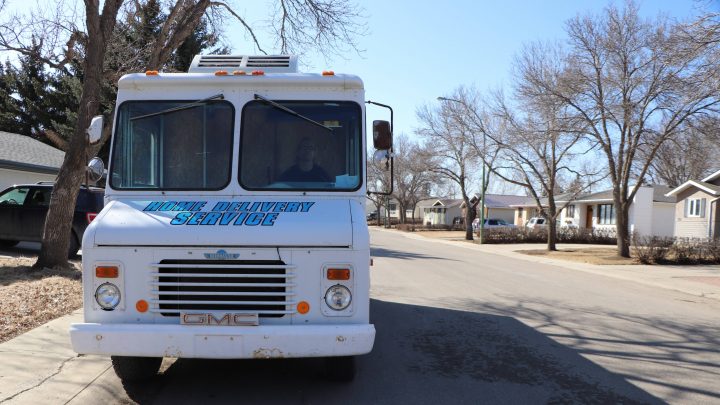The popularity of doorstep delivery during the COVID-19 pandemic has created new business for a nostalgic service.

Kevin Ramstead, the last milkman in Regina, has added 170 new homes to his rounds in the past month.
“Mainly because they just never knew there was still milk delivery in town. They thought it was kind of a thing of the past,” he said.
Ramstead was one of 17 milkmen in the city when he started 25 years ago. As others moved on, he bought their routes until it was just him, nearly nine years ago.
Before the pandemic, the 47-year-old delivered mostly to schools and daycares, along with some gas stations and homes.
To help drive house calls, Ramstead decided to advertise for the first time in years. His social media ad gained attention fast.
“Calls-wise, guaranteed, I’ve responded to at least 600 to 700 calls so far and there’s like 30 of them coming in each day,” he said.

Get weekly health news
Ramstead added that he’s not taking calls for one-off deliveries, but instead focusing his efforts on servicing committed customers on a weekly schedule.
With the increase in residential business, the milkman said he now wakes up around 2 a.m. to get to the dairy plant, pack orders and start deliveries by 6 a.m.
Ramstead grew up on a cattle farm near Broadview, Sask., before moving closer to Regina in his late teens.
“I worked for a farmer for a few years out here and just wanted to get something on my own and kind of have my own small business,” he said.
One day he came across a milkman out doing deliveries and asked him about the job. From there, he was put in contact with a man looking to get out of the business and soon, had his first route.
As for what keeps him going, the lone milkman said he loves the outdoors, the independence and the chance to meet new people.
Questions about COVID-19? Here are some things you need to know:
Health officials caution against all international travel. Returning travellers are legally obligated to self-isolate for 14 days, beginning March 26, in case they develop symptoms and to prevent spreading the virus to others. Some provinces and territories have also implemented additional recommendations or enforcement measures to ensure those returning to the area self-isolate.
Symptoms can include fever, cough and difficulty breathing — very similar to a cold or flu. Some people can develop a more severe illness. People most at risk of this include older adults and people with severe chronic medical conditions like heart, lung or kidney disease. If you develop symptoms, contact public health authorities.
To prevent the virus from spreading, experts recommend frequent handwashing and coughing into your sleeve. They also recommend minimizing contact with others, staying home as much as possible and maintaining a distance of two metres from other people if you go out.
For full COVID-19 coverage from Global News, click here.








Comments
Want to discuss? Please read our Commenting Policy first.